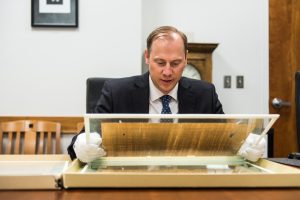
BYU religion associate professor Lincoln Blumell was recently accused of working with illegally obtained artifacts owned by Hobby Lobby.
According to Blumell, he does not work with the type of artifacts he is accused of handling, and the claims appear unsubstantiated by anonymous sources.
The Salt Lake Tribune reported it received a letter from an anonymous group of “scholars of archaeology” asking Brigham Young University to look into Lincoln Blumell’s involvement with Hobby Lobby’s illegally obtained cuneiform clay tablets, saying the involvement violates professional standards and jeopardizes the reputation of Brigham Young University and The Church of Jesus Christ of Latter-day Saints.
Blumell said he found out about the letter from the reporter at the Salt Lake Tribune and told the reporter he hadn’t purchased or handled the documents, which he said were outside his field of study.
According to his website, Blumell works mainly with Greek and Coptic texts — languages known to be written on papyrus.
BYU Asian and Near Eastern languages professor Daniel Peterson said an archaeologist would know the difference between Greek, Coptic and cuneiform, and Greek and Coptic were typically written on papyrus, not clay tablets. He said there might be rare cases of Greek and Coptic written on clay tablets, but none he’s aware of.
“I was a little surprised when I heard this story because I thought, ‘Well, he doesn’t deal with, that’s a whole separate academic and archeological specialty,” Peterson said.
He said people who study Mesopotamia, which is where cuneiform clay tablets were used, are studying a separate cultural world and time period than those of the Greeks and Copts.
Peterson said he thought it was strange the “scholars of archaeology” sent the letter to only the Salt Lake Tribune and BYU. He said it doesn’t seem to him the type of thing a person in the field of archaeology, and especially a BYU faculty member, would do.
“The fact is most of us who deal with the Middle East, the ancient East or antiquity (at BYU), we kind of know each other,” Peterson said. “If this is an issue with (Blumell) in particular, we’d bring it up with him to leverage a controversy for doing some damage against the university. It smells funny to me.”
Blumell said he was invited to view some ancient Greek Byzantine texts in the Hobby Lobby collection along with some other scholars, which he did, but the texts were in a different collection, covering a different time period and geographic region. He said he is unsure who would be making the accusations against him.
“Whenever there’s an anonymous accusation or insinuations made of this nature, I was wondering, ‘Well, who’s making it, and if they’re really legitimate, why don’t they come out and say it?” Blumell said.

According to the Salt Lake Tribune article, the coordinator of the letter did not want to speak on record because of “fear of retribution for himself and eight co-authors who have current or previous associations with BYU.”
“I didn’t know we had that many scholars of archaeology at BYU,” Peterson said. “I’m wondering who they are. I’m always leery of anonymous letters and things like that.”
Materials from the Middle East have been problematic with the trading of illegally obtained antiquities for centuries, Peterson said.
The Daily Universe reached out to BYU archeology professors. Five professors in the anthropology department are listed as archaeology professors. There is also a director of the Office of Public Archaeology and one emeritus professor of Book of Mormon archeology listed on BYU’s website. Archaeology faculty members John Clark, Jim Allison and Richard Talbot said they didn’t know anything about the situation.
Blumell also told the Deseret News he can’t read cuneiform, didn’t see the tablets and isn’t preparing anything for publication on them.




